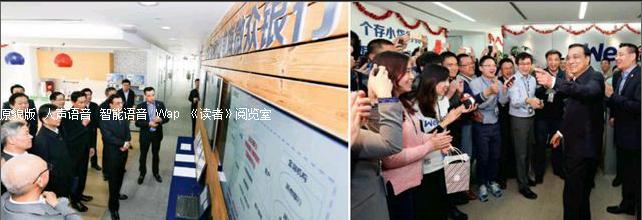A Giant Leap for Financial Reform
by+Zi+Mo

On January 4, 2015, Chinese Premier Li Keqiang pressed the ‘enter button on a computer keyboard at headquarters of WeBank, Chinas first online private bank, dispersing the banks first loan of 35,000 yuan (US$5,641) to a truck driver in Shenzhen.
Tencent, operator of the hugely popular WeChat mobile app, is the largest shareholder in the aptly named WeBank, with a 30 percent stake. The WeBank website went live on December 29, 2014.
Rise of Private Banks
Last year, Chinas financial reform took an important step forward as five privately-funded banks including WeBank were granted licenses. In March 2014, the State Council of China passed a pilot program to launch five private banks. Four months later, the China Banking Regulatory Commission approved applications to establish three private banks: WeBank, Wenzhou Civil and Commercial Bank, and Tianjin Golden City Bank. In September 2014, two more private banks, MYbank and Shanghai Huarui Banking Co., were green lit. All five banks are entirely funded by private capital.
“In past decades, the banking industry was tightly restricted in China,” explains Professor He Ziyun from the University of International Business and Economics.“The industrys recent opening to private capital marks a significant move in Chinas banking system reform.” In fact, the explosion of internet finance has already shaken traditional banks.
Despite the fact that they dont yet rival traditional banking giants in size, private banks are expected to survive market competition by providing differentiated services especially catering to small and micro businesses. As an online bank, WeBank wont have brick-and-mortar branches, and will instead focus purely on financial services, including investment and loan services, for individual consumers as well as micro-sized and small enterprises.
“WeBank is designed to be solely an internet bank,” explains Gu Min, chairman of WeBank. “Thanks to our parent company Tencents tremendous user base, we will eventually serve the greatest number of clients in China.”
Traditional financial institutions prefer to lend money to large enterprises with extensive assets. They dont often approve small and micro business operators for loans. The emergence of private banks is expected to solve the problem. As newcomers with great potential, private banks, especially online ones, are expected to soak up unmet demand in the financial sector.
During his visit to WeBank headquarters in Shenzhen, Premier Li expressed hope that WeBank would blaze a financial development path inclusive to the smallest lenders, borrowers and investors, drive down costs, and pressure traditional financial institutions to accelerate reform. He added that the opening of the bank may be“one small step for WeBank, but a giant leap for financial reform.”
Future of Online Banking
Premier Li Keqiang made WeBank the first stop on his 2015 inspection tour, a positive sign that the authorities are adopting an open, inclusive attitude towards blossoming internet finance.
“Internet-based financial companies have advantages in lower transaction costs, improved customer experience and the ability to extend financial services to more customers,” asserts Guo Tianyong, director of China Banking Research Center at the Central University of Finance and Economics. “Although traditional financial institutions have also taken action to reform their services in recent years, they lag behind their online counterparts in terms of innovation. Of course, online banks can urge their traditional counterparts to further reform only when they grow into real competition and provide competitive financial products and services.”
According to Gu Min, unlike traditional financial institutions which bear sole liability for bad debt and manage a narrow stream of investments, internet-based financial companies usually serve as online platforms for services such as crowdfunding and mobile payments, which diversifies risk.
Another advantage of online banks is that the internet, especially mobile internet, has become an integral part of daily life thanks to the popularity of smartphones and tablets. In the eyes of Ye Daqing, CEO of Chinese online financial service platform Rong360.com, WeBank is most fit for the internet era of any financial institution in China. Based on big data that Tencent acquires via its social media apps including QQ and WeChat, WeBank can link its financial services to almost all aspects of daily life, such as education, travel, medical care, and personal finance.
Internet banking is estimated to develop by leaps and bounds in next few years. As something brand new, however, it faces challenges meeting some banking supervision regulations. For instance, because online banks like WeBank lack physical outlets and deliver services via the internet, controlling risk and securing customersdeposits will be an ongoing challenge that both online banks and regulatory authorities must tackle.
Wang Yonghong, director of the Technology Department of the Peoples Bank of China, the countrys central bank, commented that online banks represent the fusion of finance and technology and contrast their brick-and-mortar counterparts in terms of physical structure, operational mode, risk control, and development strategies. He suggested authorities revise current regulations to meet requirements of the new banking industry.
In fact, the authorities have already taken action to improve regulations concerning the banking industry. In November 2014, draft regulations were issued introducing a bank deposit insurance system for the first time, which insures deposits up to 500,000 yuan (US$ 81,500) if a bank goes insolvent or bankrupt. On January 5, 2015, Chinas central bank issued a notice to open the individual credit rating market. It reported that two internet giants including Tencent are among the first five to acquire permits to enter the market.
As China deepens its financial reform, private financial institutions including online banks will enjoy a bullish market environment in the Year of the Sheep. “Youre the movers and shakers,” Premier Li Keqiang declared to WeBank staff during his visit.“The government will create a favorable, warm environment for you.”
China Pictorial2015年2期
